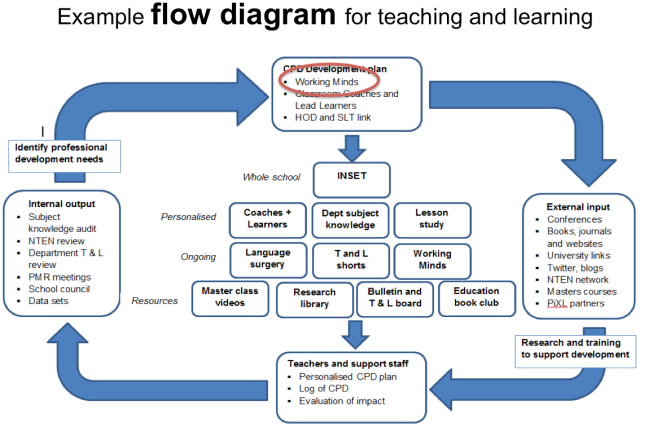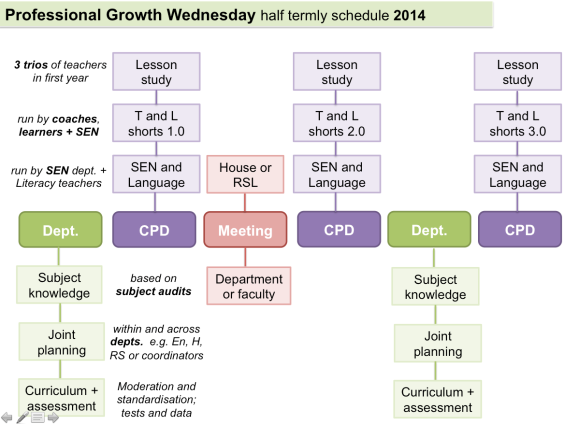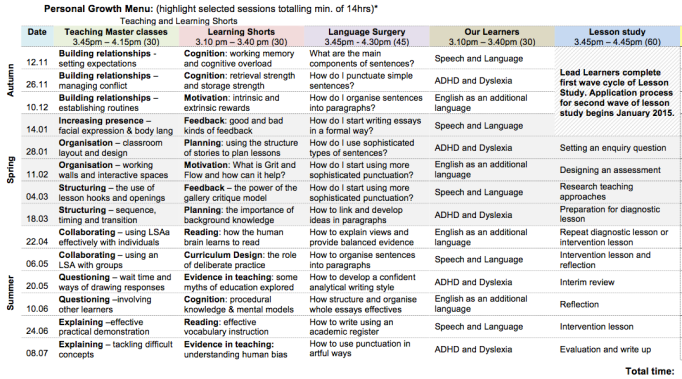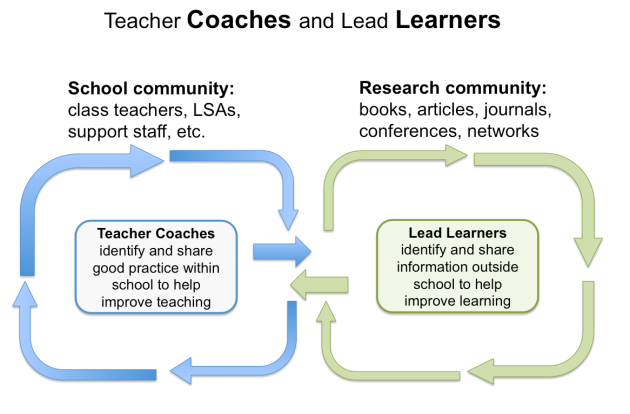‘Time is the school in which we learn, / Time is the fire in which we burn.’
Delmore Schwartz
CPD and the Second Law of Thermodynamics
Thermodynamics is the study of heat and energy. Its laws describe how energy moves around within a system. The first law describes how energy can never be created or destroyed, only transformed from one form to another. The second law concerns inefficiency, degeneration and decay, and it expresses the idea that without external energy closed systems naturally progress from order to disorder or entropy.
Schools are complex systems, with interacting or interdependent components that come together to form an integrated whole. As with all other systems, schools need external energies sources to help them thrive and to prevent the steady onset of entropy. This post outlines how we are hoping to keep our school system vibrant by harnessing the external energies of educational research and enquiry. We think it will enliven our professional development programme and complement the excellent training that already takes place within our school.
Professional Capital
We want an environment where teachers and classroom support staff think about, discuss and reflect on student learning in an informed way. Whilst I favour a stronger evidence-base as a means of establishing this kind of ethos, I realise it is unrealistic (and probably undesirable) to expect all staff to be actively engaged in undertaking research. John Tomsett and Alex Quigley at Huntington, pioneers in the use of evidence in schools, are clear about this point. John Tomsett refers to the fictional figure of Masie Tubbs, a full time teacher and parent who consistently achieves outstanding outcomes but does not really have the time to read articles, engage in action research or use social media for professional development.
For teachers like Masie, there are a number of different ways to arrive at a better understanding of ‘what works’. We are therefore building a programme of professional development (or Professional Growth as we will be calling it) that draws upon a range of different sources, and aims to be as relevant to every individual teacher’s needs and circumstances as possible. There are options to be engaged in professional growth activities at different levels of enquiry. From the more research-led participation of Lesson Study through our membership of the National Teacher Enquiry Network (NTEN), to looking at the research findings of others via the support of our recently appointed Lead Learners (see below). The good practice that already exists within the school will be spread through Master Class seminars organised by our Teacher Coaches, and other sessions run by teachers with specialist knowledge and experience.
Our Professional Growth model thus combines the best of what already exists within the building with the latest impetus and thinking from elsewhere, albeit largely distilled research at this stage. The internal energy supply is our existing teachers (teachers like Masie), whose insights and observations have demonstrably led students to successful outcomes year in and year out. At present the incoming external energy source will largely be orientated around the consumption of educational research and theory, but as we build a culture of deeper enquiry and reflection, this will hopefully lead to greater knowledge creation. In this sense the structure of our Professional Growth look inwards and outwards: it builds upon what we already do well, but it also seeks to learn from outside what we can do to be even better.
Professional Growth Wednesdays
Professional Development that is structured into blocks does not really work. Whilst there are occasions when whole a whole school INSET might be beneficial or necessary, such as for the coming together of staff around a core theme or message, ideally PD should be embedded within the fabric of the working week. Professional development cannot be seen as a bolt on to the ‘real work’, with extra activities that people do and or have done to them long forgotten or discarded once the day is over. After several years flirting with different modes of delivering staff training – twilight sessions, action research and day workshops – it has become abundantly clear that for meaningful personal growth to occur our teachers must have the time, resource and support necessary to enable them to engage, refine and critique their practice on a regular basis.
From September we are therefore collapsing our meeting cycle and making every Wednesday afternoon a time for some form of Professional Growth. We operate a two-week timetable and each week will alternate between department INSET time (to be designed by departments to work on areas such as subject knowledge, joint planning etc.) and a personal choice from a menu of Professional Growth activities (sessions run by teachers for teachers). In the first half term back every member of staff will plan their own training diet, which will include some time for independent reading and reflection. Whilst this is still not enough time, it is a step in the right direction.
Teacher Coaches and Lead Learners
For a while now I have been wrestling with the extent to which I think our profession can and should be guided by evidence. I am personally convinced that the new dawn of educational research we appear to be entering into is the best thing to happen to education since I have been a teacher. It feels exciting and the right way for our profession to bring about sustained improvement. Yet, I am also aware that in many respects we just don’t know the true impact that a research-led approach to school improvement will have on student outcomes and that properly scrutinising first hand findings is an acquired skill that many teachers do not currently possess. Studies likes that being conducted by Huntington School and the EEF should hopefully provide us with both some of the answers as well as the tools to deliver them effectively, but in the meantime it seems we just don’t know. My intuition (which is increasingly becoming a dirty word) tells me that we should be aiming to be a more informed profession, but regardless of what studies reveal, I would think that given the complexity and range of variation within our profession there will always be a place for listening to experience and heeding to common sense.
This all means that I think there are a number of judgements, particularly on the behaviours of teachers in classrooms, which can and should continue to be made for the benefit of others. A study is not necessary for me to make a case for using a seating plan, or to advise an NQT against talking over their students. Get a group of experienced teachers in a room and I think they would all pretty much agree on the same or similar methods to create an environment conducive to learning. Now whether this then leads to learning is perhaps an entirely different matter, which is why I think it is helpful, at least as a starting point, to think of behaviours for learning and behaviours of learning: in the former the focus is on the actions and behaviours of the teachers, whilst in the latter the attention turns more to the learner. For the past few years our Teacher Coaches have worked very successfully with colleagues on enhancing key aspects of how they manage their classrooms better and create the conditions in which learning is more likely to occur, such as organising space, time, positioning and the use of resources. Going forward, our Coaches will continue to share insights like these, either on a one to one basis with those who request it, or through Master Class seminars that form part of our Professional Growth menu. There may be scope here in the future for the kind of practice sessions advocated by Doug Lemov in his taxonomy of teaching techniques Teach Like a Champion.
Lead Learners are somewhat different to Teacher Coaches. Whereas Coaches focus more on the behaviours of the teacher and deal more with the ‘certainties’ of classroom management and instruction, Lead Learners will focus more on the behaviours of the students and to the messier, harder to discern (and even harder to evaluate) process of learning. As with the Coaching model, the different insights into learning will be arranged into a common framework, which will be used to direct the work of the Lead Learners and give structure and coherence to their research activities. These areas can be seen as different lines of enquiry that each Lead Learner pursues in an effort to build up levels of expertise. I will blog about these frameworks in due course.
The insights into learning that each Lead Learner gleans – from a combination of wider reading and active enquiry via Lesson Study – will also be shared with staff as part of the Professional Growth programme. Through a variety of digestible formats, such as presentations, short distilled research overviews or shorts and one-to-one support, our staff will be able to benefit from the insights and findings of others. These formats will act as an ever-involving resource for teachers to enable them to better understand the impact of their teaching on their students’ learning, and to make informed adjustments to their teaching.
Working Minds

The core objective of ensuring quality ongoing professional development is more likely to be met if teachers themselves are responsible for leading and shaping the majority of the training. The division of teacher support and training into Teacher Coaches (behaviours for learning) and Lead Learners (behaviours of learning) is a significant step towards establishing a CPD programme designed by teachers for teachers. This bottom up impetus will be further enhanced by the development of a Working Minds Group – a kind of think tank or executive body that meets each term to share experiences on the ground and to work collaboratively to plan and deliver training that meets the needs of both teachers and support staff.
The Working Minds Group will comprise the Teacher Coaches and Lead Learners, as well as the SLT member responsible for Teaching and Learning. In addition, the Group will include a number of enthusiastic volunteers keen to make a significant contribution to the development of staff training and, in turn, the school itself. I think it is important that there is at least one non-teacher as part of this group. As well as having significant responsibility for shaping the school’s Professional Growth programme, the Group will also have a considerable voice on the implementation of Growth Mindset principles. Such an approach will hopefully ensure that a culture of learning will gain a bigger and more sustainable buy-in from staff and that Growth Mindset will not become yet another fad, but an intrinsic part of the way that members of our school system approach their learning, whether as a pupil, a member of the site staff, school office or a classroom teacher. At least, that is the hope!
Time is a fire
The second law of thermodynamics is ultimately an expression of a sad, painful truth: that since our universe (indeed all universes) is in itself a closed system, there will come a time – millions and millions of years from now – when it too will run out of energy. This law gives us a lens through which to understand the fragility of time, an understanding so beautifully captured in the Delmore Schwartz’s couplet I used as a preface to this post. And so, if time really is ‘the fire in which we burn’, we need to make sure that the precious time we have available to us at home and at work really is ‘the school in which we learn’.





Reblogged this on ProfLearnSVC and commented:
Interesting ideas about Professional Learning…